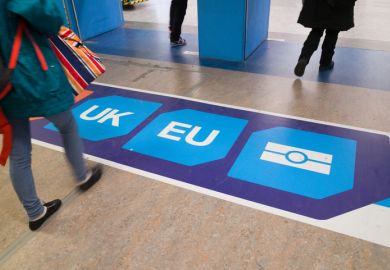Source: Getty
Phrase book not needed: people can pursue master’s degrees in English in a growing number of places across the Continent
Thousands of international students may be shunning the UK in favour of continental Europe, where a growing number of courses are being offered in English, a study suggests.
A total of 6,407 taught master’s programmes in the language were offered on the Continent in June this year - a 38 per cent rise on the 4,644 courses available just 18 months earlier, according to a report by the New York-based not-for-profit organisation the Institute of International Education.
That total was 10 times higher than the overall number offered in 2002, says the report, titled English-Taught Master’s Programs in Europe: A 2013 Update.
The study is based on course listings from the Study Portals website, which provided information from 1,200 public and private universities in mainland Europe.
Programmes in English account for almost a third of the 21,000 master’s courses advertised on the site in continental Europe, the report indicates.
Fading attraction
The increased selection of continental master’s programmes in English may explain why applicants visiting Study Portals are becoming less likely to search for courses in the UK, the report suggests.
The UK’s share of page views fell from 31 per cent in 2011 to 24 per cent in 2013, while Germany’s share rose from 14 per cent to 18 per cent over the same period.
Interest in courses in Sweden and France also increased.
“Interest in the UK from potential master’s students is still strong and it is growing, but it is not growing as fast as interest in other countries,” said Elias Faethe, head of Study Portals’ Intelligence Unit, who co-authored the report.
“If you look at the main competitor countries to the UK in Europe, they are all pushing forward their efforts to attract high-quality international students, and English-taught courses are a way to do this.”
Several Scandinavian countries appear to have switched almost all their postgraduate teaching to English, the report says.
Some 708 master’s courses in Sweden were taught in the language this year - an increase of 73 per cent on 2011 figures and more than four times the number offered in 2007.
The Netherlands provides the highest number of English-taught master’s degrees on the Continent, with 946 available compared with 386 six years ago.
Meanwhile, Germany has 733 master’s programmes taught in the tongue this year - up from just 88 in 2007.
In France, where a law banning teaching in anything but French is loosely enforced, the number of master’s courses available in English has soared from just 11 in 2007 to 494 this year.
Teaching master’s courses in English was just one of several moves by a number of countries to attract intelligent, highly skilled students to stay in the long term, Mr Faethe said.
“There is a clear direction towards more internationalisation, particularly in Germany, which is doing so for demographic reasons,” he said.
Rivalry hots up
With Asian countries such as China and Hong Kong also offering courses in English, the UK may struggle to attract the same number of international postgraduates, especially given the coalition’s decision last year to shut down the post-study work visa route, said Daniel Stevens, international students officer at the National Union of Students.
“The traditional destinations to study in English, such as the US, the UK and Australia, are no longer a given,” he said.
“Other countries are realising the benefits of attracting international students and, crucially, their governments are behind them, offering visas that include the chance of working afterwards.”
The growth in master’s courses in English reflected “the desire of students to operate internationally in the world’s working language”, a British Council spokesman argued.
“However, the language a course is taught in is just one part of the attraction: students want to learn in English, but then also speak English outside the lecture hall.”
He added: “The UK attracts more new higher education students than any other country in the world, and research shows that the overall teaching and learning experience the UK provides makes the difference.”
| Country | Number of taught master’s programmes in English (June 2013) | % increase since Dec 2011 |
|---|---|---|
| Source: English-Taught Master’s Programs in Europe | ||
| Netherlands | 946 | 16 |
| Germany | 733 | 13 |
| Sweden | 708 | 73 |
| France | 494 | 43 |
| Spain | 373 | 14 |
| Denmark | 3 | 74 |
| Italy | 304 | 60 |
| Switzerland | 281 | 19 |
| Finland | 261 | 52 |
| Belgium | 253 | 18 |
Register to continue
Why register?
- Registration is free and only takes a moment
- Once registered, you can read 3 articles a month
- Sign up for our newsletter
Subscribe
Or subscribe for unlimited access to:
- Unlimited access to news, views, insights & reviews
- Digital editions
- Digital access to THE’s university and college rankings analysis
Already registered or a current subscriber? Login




